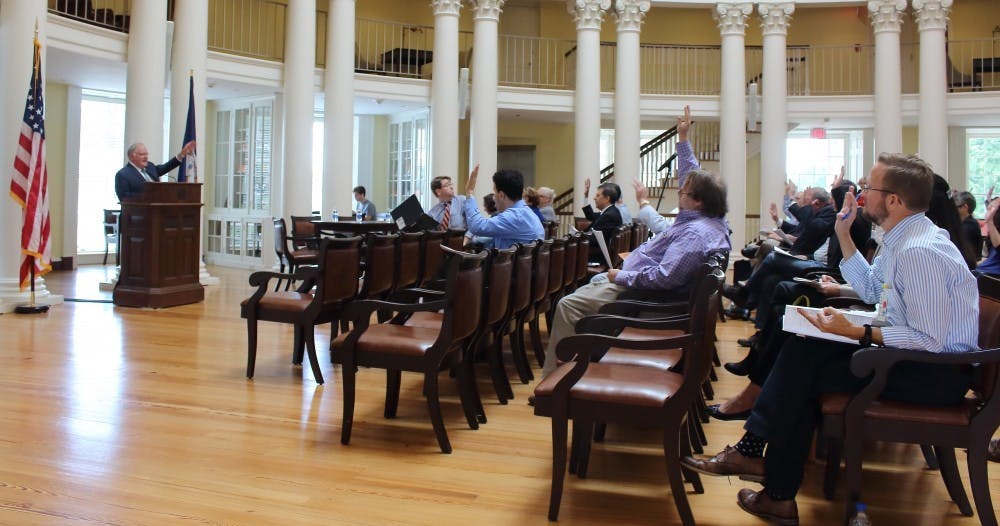Tenure-track faculty who meet eligibility criteria will automatically be granted an additional probationary year, according to University Provost Liz Magill’s recent memo. While the Faculty Senate and the American Association of University Professors at the University support this decision, both said that they would like to see this extension apply to non-tenure-track professors as well. Currently, the change will only apply to tenure-track faculty whose contracts prescribe a start date before April 1, 2020 and were scheduled to undergo tenure review in the 2020-21 academic year or later.
Tenure-track faculty — professors who are currently in a hiring stream at the end of which they will be considered tenured faculty — hired after April 1, 2020 and any other tenure-track faculty who require extra tenure clock extension due to the COVID-19 pandemic must request an extension. In contrast to other faculty, tenured professors can expect ongoing employment from the University — typically, the tenure track is about five to seven years, at the end of which there is a tenure review, which examines a professor’s research, teaching and service to the community. When a tenure-track professor passes their tenure review, they are considered tenured.
“The University acknowledges that junior faculty are placed in a particularly precarious position due to the coronavirus pandemic,” said Maite Brandt-Pearce, vice provost for faculty affairs. “Tenure-seeking faculty have ambitious standards to meet during the first few years here, and the pandemic has made it difficult, if not impossible, for many to do so.”
According to Ellen Bassett, chair of the Faculty Senate and professor in the Architecture school, the extension will be especially beneficial to faculty whose research has been disrupted by the current pandemic. The Faculty Senate, which is made up of professors representing all of the academic schools, advises the President, the Rector and the Board of Visitors with regard to educational and related issues at the University.
“Say you’re a lab scientist and you can't run experiments right now because you can't get to your lab and you can't have your group of students working with you, or you're a historian and you can't get to a very critical archive because you can't travel,” Bassett said. “You're not going to have any ability to do that research, so a lot of research has been slowed down and this [decision] recognizes that.”
Walter Heinecke, an associate professor in the Curry School, agreed that this decision was a positive development. Heinecke is the immediate past president of the American Association of University Professors at the University, an organization that advocates for faculty on issues of shared governance and academic freedom.
“We are one faculty,” Heinecke said. “We do not believe such a decision should be left up to individual deans but should be a matter of University-wide consistent policy.”
Herbert Tucker, professor in the English department and current president of AAUP at the University, agreed with Heinecke’s concerns.
“We applaud the recently announced policy offering accommodation to faculty whose research and teaching program has been disrupted by the conditions imposed on each of us by the coronavirus pandemic,” Tucker said. “We at AAUP remain concerned, however, that the policy as stated does not extend to cover all faculty. We are sharing the brunt equally. Measures of relief should be shared equally too, and should be extended to contingent faculty as well as those on tenure track.”
Additionally, AAUP has released an official statement concerning principles to guide higher education’s response to the COVID-19 pandemic nationally. The University’s chapter of AAUP has forwarded this document, along with an additional statement regarding faculty decision-making and principles and standards concerning the crisis, to University administration.
“Faculty members, particularly adjunct/contingent faculty and those on the tenure track who are not yet tenured, should be protected against the punitive use of negative teaching evaluations during the period of the disruption,” the statement reads.
Similarly, Bassett said that the Faculty Senate’s Executive Council recently passed a statement asking the Provost’s office to do the same. Bassett said that while non tenure-track faculty don't go through tenure review, their performance is also reviewed in a similar process to renew their contracts, so they too could benefit from an additional year of preparation.
“We just think it would be fair,” Bassett said. “Uniform treatment of the faculty is important.”
Faculty are also permitted to opt-out of these changes and use their normal clock for review, but those decisions will be final.
“We do, however, recognize that some faculty were ready to submit to a tenure review on schedule, and if they are ready, we encourage them to do so,” Brandt-Pearce said. “Both the decision to grant an extra year and the option to go ahead if ready are the approaches followed by most of our peers nationally in the wake of the pandemic.”







